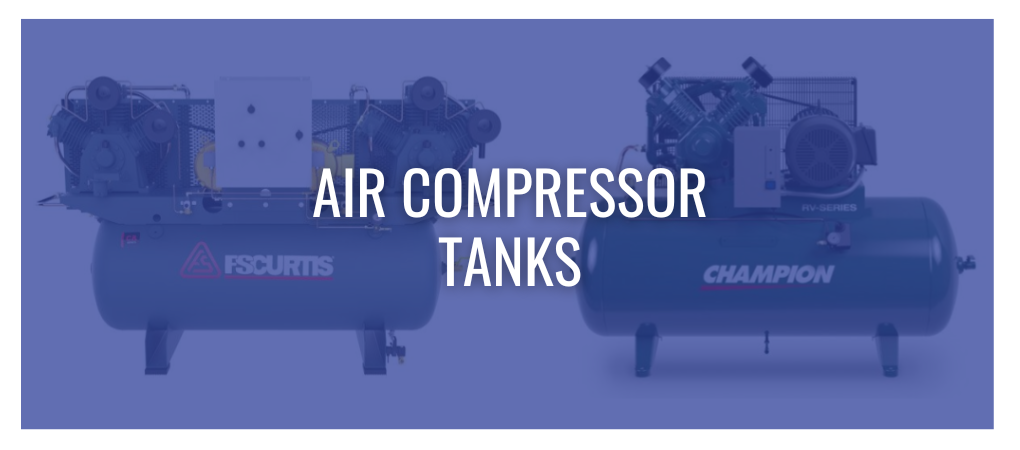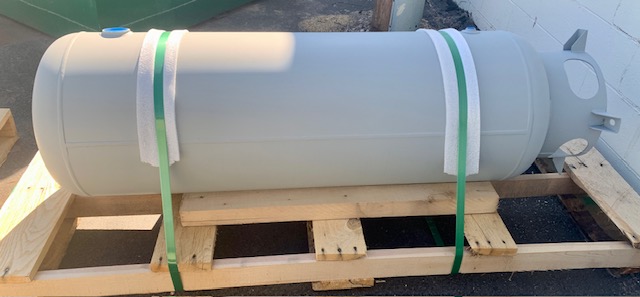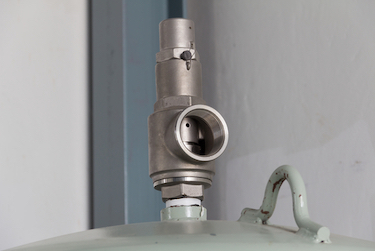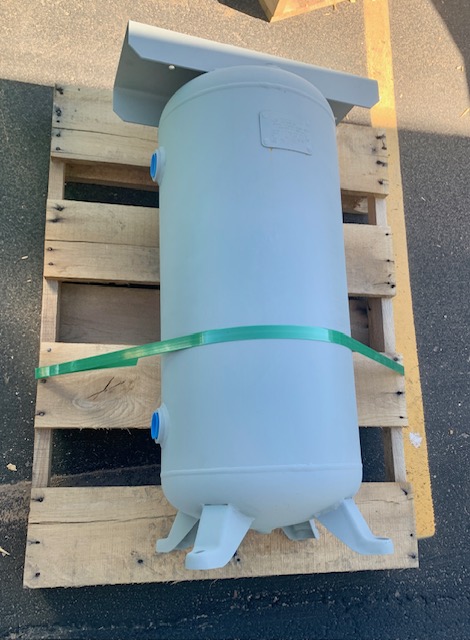
Air compressor tanks are the unseen powerhouses that enable everything in the busy world of industries, workshops, and home remodeling projects. Air Power Equipment Co. has been in the business for over 40 years and is the clear market leader in Oklahoma for air compressor sales. We provide a wide range of equipment as well as extensive knowledge of maintenance and support. APEC will walk you through the subtleties as you take a closer look at air tanks and answer any important concerns that may come up. With our extensive knowledge and friendly approach, APEC is the top choice for anyone looking to become an expert in air compressor tank maintenance or custom setups.
How to Clean the Air Compressor Tank
It’s essential to give air tanks routine maintenance. APEC promotes regular cleaning to guarantee durability and peak efficiency. An easy-to-follow cleaning guide helps customers maintain basic tanks. Here are the steps to follow:
- Prepare: Make sure the compressor is disconnected and switched off before doing any repairs. Opening the drain valve releases any residual pressure.
- Drain the Tank: Remove any hoses or attachments from the tank after the pressure releases. To release all the air, fully open the drain valve. It is safer to clean after taking this step.
- Moisture Removal: Tanks frequently experience an accumulation of moisture, which causes rust and corrosion. Use an air line filter or a moisture trap to eliminate extra moisture. To remove any last traces of moisture, run the compressor briefly.
- Tank Cleaning: To clean the inside of the tank, use a solution of warm water and mild detergent. Use a brush to scrub the interior walls to remove rust, oil residue, or debris. To get rid of any detergent, rinse it with fresh water.
- Tank Drying: Allow the tank to air dry thoroughly after cleaning. Ensure it is dry before reattaching the hoses or turning on the compressor.
- Expert Maintenance or Replacement: Consider professional servicing for intricate cleaning or working with older tanks with deeper problems. It may be more cost-effective to replace the tank if it is too rusted or damaged.
We advise including tank cleaning in routine maintenance plans. To ensure the longevity and optimum functioning of the tank, we also provide expert cleaning services for complex cleaning requirements. We offer tank replacement alternatives to preserve the compressor system’s efficiency for older or irreparable tanks.
Can I Add a Tank to My Air Compressor?
Increasing capacity and meeting growing air supply demands may be accomplished by adding a tank to your current air compressor configuration. These are the steps and things to consider:
- Check for Compatibility: Assess your existing air compressor setup to see whether more tank connections are possible. Although most compressors can accommodate additional tanks, it is crucial to confirm compatibility before moving ahead.
- Connecting the Tanks: It’s really easy to add a tank if your compressor allows it. Finding your compressor’s specified port or connection point should be your first step. Next, attach the new tank firmly using the proper fittings and hoses.
- Controlled Pressure: To ensure the new tank functions well with the old one, change the pressure settings as soon as it is attached. Distributing the pressure evenly among several tanks guarantees an even and continuous airflow.
- Aspects of Performance: Adding a tank expands your compressed air storage capacity overall, allowing you to use the compressor for longer periods without cycling on and off frequently. It’s a useful addition for tasks that need constant airflow or when the capacity of your current tank is insufficient.
APEC is an expert at customizing air compressor configurations to match specific requirements. Our team’s competence lies in setting up systems for larger tank capacity, guaranteeing compatibility and peak efficiency.
Can I Put a Bigger Tank on My Air Compressor?
The available volume of compressed air can increase when you upgrade to a larger tank. As a result, your tools will operate for extended periods without requiring frequent compressor cycling. A few important things to keep in mind while deciding whether to replace your air tank with a larger tank are as follows:
- Compatibility Matters: Confirm whether you can use a larger tank with your current air compressor. There are differences in the capacities and maximum sizes of tanks that various compressors can efficiently handle.
- Higher Efficiency: A bigger tank allows the compressor to cycle less frequently, lowering the compressor motor strain. Increased efficiency often translates to less energy usage and possibly longer equipment life.
- Proper Setup: Correct installation is essential when integrating a larger tank. This entails tightening fittings, inspecting for leaks, and maximizing system efficiency. APEC has more experience that extends beyond installation. We fine-tune the system to guarantee optimal efficiency and performance from the new tank and the compressor.
Air Power Equipment Co. professionals can guide you if you require a larger tank for improved performance or more air capacity. To suggest the best tank size for your particular requirements, considering your existing setup, your usage needs, and the compressor’s capabilities. We also offer an extensive selection of air tanks with compressors to serve various needs.
Do Air Compressor Tanks Expire?
There isn’t an expiration date stamped on an air tank with compressor. However, the tanks have a lifespan impacted by several variables. Although these tanks can withstand continuous use and pressure, wear and tear eventually becomes unavoidable.
Factors Impacting Lifespan
- Quality of Material: The longevity of the tank is largely dependent on the quality of the materials used in its construction. Tanks with stronger construction typically have longer lifespans.
- Maintenance: Keeping the tank well-maintained is essential to increasing lifespan. Avoid premature wear with routine inspections, cleanings, and timely problem-solving.
- Usage Intensity: The frequency and intensity of tank use influences its wear. Compared to occasional use, heavy, continuous use can diminish its lifespan.
- Environmental Conditions: Exposure to corrosive substances, harsh conditions, and severe temperatures can accelerate the tank’s degradation.
- Pressure Fluctuations: Regular shifts in pressure might put stress on the tank and shorten its lifespan.
Replacement Considerations
Air Power Equipment Co. stresses proactive maintenance to prolong the life of an air tank with compressor. We provide routine maintenance assistance to identify possible problems early on and suggest replacements when needed. Our experts advise replacing the tank when the following symptoms happen:
- Visible indications of rust or corrosion, particularly along weld seams or on the outside of the tank.
- Unusual vibrations or noises when the machine operates could indicate internal problems.
- Regular leaks or dips in pressure that maintenance cannot fix.
- Age also matters. Even with regular maintenance, older tanks may be more prone to problems.
Do Air Compressor Tanks Explode?
The misconception that an air tank with compressor can blow up leads to constant worry among users. Air tanks are made with strict safety regulations to avoid disastrous incidents. High-grade steel or aluminum alloys get frequently used in construction because of their strength and capacity to withstand pressure. These tanks undergo extensive testing to ensure they can sustain the enormous forces applied by compressed air.
Pressure relief valves are inside every air tank with compressor. If the extra pressure exceeds the specified safe limit, these valves immediately release it. Doing so keeps the tank from getting to the point where a failure could occur. The valves are a vital defense against over pressurization by acting as a fail-safe mechanism.
The knowledgeable experts at APEC are always ready to offer advice if customers have any questions or concerns regarding the security of their horizontal air tanks. APEC is committed to guaranteeing customers’ safety and satisfaction, whether it is through performing inspections, clarifying the operation of safety features, or attending to specific issues.
Does Air Compressor Tank Size Matter?
The size of an air compressor tank impacts performance and efficiency. The air compressor’s reliability in tool performance depends on the tank; therefore, the size should be appropriate for the intended use. While smaller tanks may be more efficient for smaller operations, larger tanks, such as 30-gallon tanks, provide sustained airflow for continuous instruments like sanders. Compressor life is increased with less cycling when using larger tanks.
With expertise in tank sizes, Air Power Equipment Co. guarantees accuracy for various industries, including construction and automotive, while juggling space constraints with performance requirements. We base our recommendations on a customized strategy that maximizes tank capacity to satisfy specific needs. For frequently used tools, larger tanks are better suited than smaller ones. This guarantees that performance, efficiency, and spatial factors are perfectly balanced.
How Long Do Air Compressor Tanks Last?
Comprehending the air tank lifespan is critical to keep your pneumatic systems operating safely and efficiently.
Factors Affecting Lifespan
Material Quality: Strong steel or aluminum tanks have a lower corrosion rate, which increases their longevity.
Environmental Conditions: Extreme temperatures or exposure to corrosive materials can accelerate wear and tear.
Maintenance Procedures: Tank lifespan depends partly on the rate of maintenance. Neglecting regular maintenance and cleaning can hinder performance and accelerate the wear on the unit.
Regular Maintenance Procedures
Follow these maintenance practices to increase the air tank’s lifespan:
- Perform routine visual checks to spot any indications of rust, corrosion, or structural flaws.
- Keep your air tank compressor clean regularly to avoid contaminants, moisture, and debris accumulation inside the tank.
- Make sure the pressure relief valve is always operating properly. This safety element reduces the possibility of a tank failing by preventing excessive pressure buildup.
Our competent workforce at APEC manages routine maintenance, spotting, and fixing problems before they worsen. When a tank’s useful life ends, APEC provides an uninterrupted replacement process.
How Do You Fill an Air Compressor Tank?
Filling an air tank with compressor is a simple procedure to ensure maximum performance. To fill your high-pressure air tank safely and effectively, follow these steps:
- Get the compressor ready: Make sure the compressor is switched off and positioned on a stable platform. If your compressor demands it, check the oil levels and ensure no leaks.
- Attach the Hose: Firmly fasten the air hose to the outlet valve of the compressor. Make sure the fitting is tight to avoid any air leaks while filling.
- Switch on the Compressor: Turn it on to activate the compressor. As the air in the tank begins to fill, you will hear the motor running. Watch the pressure gauge to monitor the air pressure inside the tank.
- Monitor the Pressure Levels: The Majority of compressors include an automatic shut-off feature that shuts it down once the compressor reaches the required pressure level. If not, monitor the pressure gauge and manually shut off the compressor whenever the tank exceeds the recommended pressure threshold.
- Release Pressure: After filling the tank, turn off the compressor and open the release valve to let off the remaining pressure in the hose. This procedure helps avoid any pressure buildup in the hose when detaching it.
- Unplug the Hose: Carefully unplug the air hose from the compressor’s outlet valve. To prevent unexpected air bursts, ensure the hose is free of any remaining pressure before disconnecting.
- Equipment Storage: Keep the air compressor and its attachments in a dry, safe place. Equipment longevity and maintenance are better with proper storage.
These instructions will help you fill your portable air tanks effectively and safely so they will always be ready for use. To ensure an enjoyable experience, Air Power Equipment Co.’s professionals can assist if you have any problems or have particular queries concerning your compressor model.
Air Tank with Compressor: Air Power Equipment Co.’s Offerings
Air Power Equipment Co. provides a broad selection of air compressor tanks with a focus on sales of reciprocal and rotary screw air compressors. Prominent brands, including FS Curtis, Champion, Campbell Hausfeld, Kellogg, American, Quincy, and others, are available in our inventory. With a range of compatibility choices and capabilities, Air Power Equipment Co. guarantees a perfect fit for any requirement. Our tanks are durable, have improved safety measures, and come with customized advice from an experienced staff. Browse our inventory to choose the ideal tank supported by knowledge and attentive care.
Air Compressor Tanks from APEC
The longevity and optimal performance of air tanks are dependent upon regular upgrades and maintenance. Air Power Equipment Co. provides clear guidance and promotes safety and dependability in everything from cleaning to upgrades. Our wide selection of tanks meets a variety of demands. Air Power Equipment Co. is a reliable source for customized solutions. Contact us for knowledgeable advice that guarantees credible, effective air compressor performance catered to your specific requirements.
Air Power Equipment Company in Oklahoma City (OKC), is the leading source for new air compressor sales and used air compressor sales throughout the country. We specialize in rotary screw air compressor sales and reciprocal air compressor sales. Air Power Equipment Company is also the best source for air compressor service and air compressor parts in Oklahoma. If you are looking for new air compressors, used air compressors, air compressor parts, or air compressor service call Air Power Equipment Company OKC. We are experts with all brands of air compressor equipment and we are a stocking distributor of air compressor brands like FS Curtis Air Compressors, Champion Air Compressors, Campbell Hausfeld Air Compressors, Kellogg Air Compressors, American Air Compressors, Quincy Compressor and many more. Call us at (405) 445-1216 – we have what you need, and at the best price you will find.


